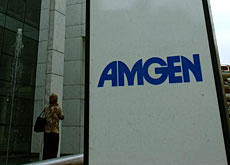Amgen decision disappoints and delights

United States company Amgen's decision not to build a new biotech production plant in Switzerland has led to a mixture of dismay and relief.
Environmentalists welcomed the move, while the economics ministry, regional authorities and the business community expressed disappointment.
Amgen, the world’s biggest biotechnology group, announced on Tuesday that it had chosen a location in Ireland for its new production plant, giving Switzerland the cold shoulder.
The company said it had opted for Ireland because of its thriving biotechnology community, infrastructure and attractive business climate.
Rolf Hofmann, head of Amgen International, denied suggestions that Swiss tax policies had tipped the balance against the site in canton Fribourg in western Switzerland.
Swiss Economics Minister Joseph Deiss said he was disappointed with Amgen’s decision, but acknowledged that international competition was heating up.
He added that it was crucial to step up cooperation between the federal and cantonal authorities to remain competitive and avoid a repeat of the Amgen case.
Tough competition
The Fribourg cantonal authorities said a great opportunity had been missed to create more than 1,000 jobs.
They had been lobbying for the world’s biggest biotech firm to move to a greenfield site near the village of Galmiz and had reclassified 55 hectares of farmland as an industrial zone in an effort to coax Amgen to build its production plant there.
In the same vein, the Swiss Business Federation, economiesuisse, deplored Amgen’s decision.
It said Switzerland had to be aware that wealth was also based on production capacities, the necessary infrastructure and tax laws.
The federation blamed environmentalists for stirring up public opposition to the plans for a factory in Galmiz.
Worth fighting
The Green Party said it was pleased to see that it had been worth fighting for its cause.
But it pointed out that it was disappointed that the biotech firm did not choose another site in Switzerland instead of settling on Ireland.
The Foundation for the Protection of the Countryside, which had been at the forefront of the protests, said it had succeeded in preventing the setting of a dangerous precedent.
But it refused to take the blame for the failed Galmiz bid.
“The mistake was made by the federal and cantonal authorities. Instead of agreeing on one manufacturing site, two cantons fought each other,” foundation director Raimund Rodewald told swissinfo.
Complexity
For Stéphane Garelli of the Lausanne-based International Institute for Management Development (IMD), Ireland’s victory over Switzerland is the result of a concerted effort.
“They have an uncomplicated process for facilitating such a move. Amgen were probably put off by the weight of opposition to their development plans and by the complexity of investing in Switzerland,” Garelli told swissinfo.
For its part the Irish Congress of Trade Unions said foreign firms were mainly attracted to Ireland by a pool of well-qualified, English-speaking workers, and to a lesser extent by tax breaks.
“Over the past 15 years, Ireland has built up a highly educated workforce, particularly in pharma and IT,” Macdara Doyle told swissinfo.
He added that pay and conditions were not likely to be decisive for foreign investors since average industry wages in Ireland (€30,000 – SFr46,420 a year) were above the European Union average, and had risen by 12.5 per cent from 2003 to 2005.
Tuesday’s announcement by Amgen ends 15 months of speculation over a new production plant in Switzerland.
However, the California-based company is keeping its European headquarters in the central Swiss town of Zug. The group employs more than 14,000 people worldwide, 300 of them in Switzerland.
swissinfo with agencies
Switzerland is an attractive location for foreign firms’ head offices, thanks in part to low corporate taxes.
But setting up factories is more complicated because of competition and differing rules among the 26 cantons, as well as the system of direct democracy, which allows local residents to influence planning proposals.
Foreign firms wanting to invest in Ireland, by contrast, need deal with only one central authority, and pharma companies in particular enjoy generous tax breaks.

In compliance with the JTI standards
More: SWI swissinfo.ch certified by the Journalism Trust Initiative










You can find an overview of ongoing debates with our journalists here . Please join us!
If you want to start a conversation about a topic raised in this article or want to report factual errors, email us at english@swissinfo.ch.